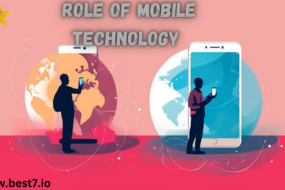
In today’s fast-moving digital age, mobile technology has a substantial contribution to the transformation of the nature of remote work. With the introduction of various mobile solutions, traditional workplaces are being converted into new flexible and responsive environments, paying much attention to the above-mentioned factors as productivity, communication, living standards, and free time.
An increasing number of employers are resorting to telecommuting, which leads to the logical necessity to apply mobile applications and other corresponding solutions in order to initiate an efficient digital workplace.
Impact on Productivity
It is difficult to overestimate the impact of mobile technology on productivity in the course of the already remote work. According to a detailed study conducted by Gallup, US workers who spend at least 20 percent of their time remotely are more and 20% more productive than their office-based colleagues.
Productivity increase is mostly explained in terms of the flexibility supported by the application of such technology. Businesses that promote remote work allow their employees to access necessary applications and documents for work on their mobile devices from anywhere, becoming a part of the BYOD initiative. Such an obligation triggers a highly effective workflow and time management for the employees.
Role of Mobile Applications
The role of mobile applications in this process can hardly be overestimated. Many mobile tools and applications for task management, project undertaking, and communication have filled the gap in workplace operations.
With regard to a study appeared in Business News Daily, as many as 84% of surveyed employees believed that their productivity increases as a result of using mobile applications. This fact proves that this form of technology has a tremendous impact on the workplace, facilitating effective collaboration in a physical absence.
Collaboration Tools in Remote Work
Collaboration tools are one adopted major mobile technology as they facilitate and improve communication among remote workers. These include Slack, Microsoft Teams, and Zoom, which enable sharing of files, chat conversations, and video calls.
Teams of workers who are at a physical distance from each other are able to communicate and share ideas in real time. Hence, even when employees are not at their workplace, they can easily be kept in an organization’s loop as they are able to be informed or even inform remotely.
Gartner, in a survey related to collaboration tools use, reported that organizations that employ the use of collaboration tools reported a 25% increase in employee engagement. Hence, even with remote work, mobile technology has only positive effects on the morale and connectedness of the workforce.
Benefits of Cloud Computing
Cloud computing is another technology that has facilitated improved remote work as it allows for the storage of data which can be accessed by an employee from any device with the appropriate credentials.
Files, spreadsheets, and projects can be worked on in real time by different team members even though they are situated in different parts of the world. The ability to facilitate efficient work in this way reinforces the culture as teams understand the importance of teamwork and collaboration.
In addition, organizations that adopt cloud technology have shown to have up to 50% of costs related to IT reduced, mainly because the technology is used to efficiently facilitate work with a distributed workforce. Hence, organizations are not only able to work better with reduced costs but can allocate IT resources more efficiently.
Enhancing Workforce Flexibility
Workforce flexibility is the most critical area where mobile technology plays a crucial role. Using smartphones and tablets, employees can both use mobile communication and various applications to monitor the completion of tasks, participate in meetings, and interact with other employees, no matter where they are. It is especially crucial in the context of the incompatibility of work schedules and employees’ personal plans.
The findings of the survey conducted by FlexJobs determined that 73% of professionals consider work-life balance the primary benefit of remote work. At the same time, due to mobile virtual private networks, as well as other secure access solutions, companies can provide employees with the effective protection of their data. As a result, job satisfaction and retention rates among employees tend to increase.
The Importance of Remote Access
Another crucial area is remote access. The role of mobile technology in this sphere is associated with the ability of employees to use various business applications and tools to work outside the office and home. As a result, virtual private networks and other solutions have become necessary for organizations.
It is explained by the fact that they protect data from attacks by outsiders and ensure information remains private. The adoption of this technology provides organizations with a range of opportunities, including a high level of job satisfaction and increased retention rates among employees.
Ensuring Business Continuity
Business continuity is another vital area. The COVID-19 pandemic revealed the fact that remote work is only effective if the necessary mobile technologies have been already adopted by companies. As a result, organizations were either able to switch to remote work or not.
Concerning the rates of business performance, according to the existing report, companies that have already turned to digital transformation at the moment of the pandemic experience a 20-30% increase in operational efficiency.
Rethinking Business in the Digital Era
In the era of digital transformation, mobile technology plays a significant role in rethinking traditional ways of doing business. Companies start using various forms of data analytics and AI to improve decision-making and customer experience.
In many cases, mobile applications with embedded advanced analytics technologies help enterprises understand user behavior. However, its impacts are more significant, as evidenced by the report by Deloitte. Those organizations that implemented advanced analytics into their mobile application strategies were able to increase customer satisfaction by 40%. Ultimately, technology has positive effects on business.
The Future of Mobile Technology in the Workplace
The widespread use of mobile technologies will continue to be employed in the future of work as it changes the understanding of remote work. Those employers who focus on developing solutions to better meet mobile demands will enrich the workplace with productivity, collaboration, and innovation. PwC’s report indicates that 83% of employers will offer more flexible setups.
The employee engagement trend is also supposed to remain significant. The prevailing modes of work dictating the necessity to maintain connection among employees will be effectuated as employers invest more resources into instruments supporting the communication of remote teams.
The report by Gallup participants presented evidence that engaged employees are much more productive by 21%, so the concerns of employees are created will continue taking high priority. Mobile applications, communication tools, and cloud resources fully embody the aspired frameworks of work in a digital context, which allows better meeting the goals of employees and customers.












